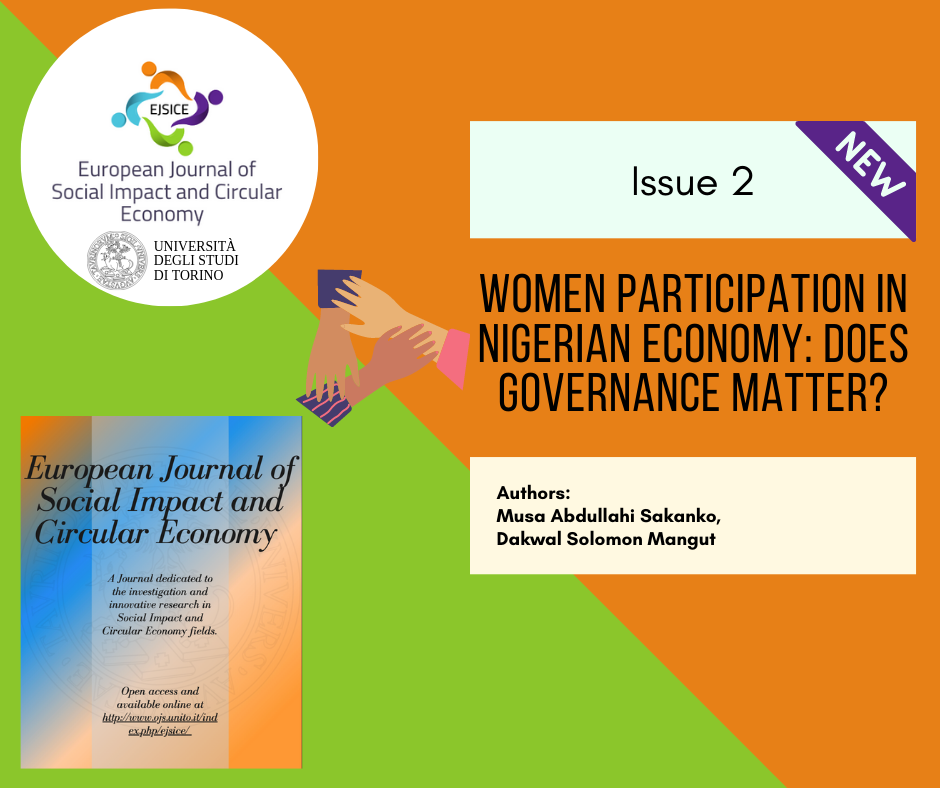Women Participation in Nigeria: Does Governance Matter?
DOI:
https://doi.org/10.13135/2704-9906/4943Keywords:
ARDL model, Accountability, Control of corruption, Effectiveness, Women's participationAbstract
This study examines the effect of governance on women's participation using annual time-series data for 29 years spanning from 1990 - 2019. The ARDL Bounds test discloses the existence of a long-run co-integration relationship between accountability, control of corruption, and effectiveness of government and women participation in the labor force. The empirical results obtained revealed that both in the short-run and long-run accountability and the percentage of female employment have a positive and statistically significant effect on women's participation in Nigeria. Although, both in the short-run and long-run the effectiveness of government shows negative and statistically insignificant, the control of corruption exerted a negative and statistically significant impact both in the short-run and long-run. Therefore, the study recommends that the government at all levels should ensure that accountability prevailed in every sector, to allow fair play in representatives, employment, and diffusion of decisions to strengthen and energized women's participation.
References
Asian Development Bank (2005). Country Governance Assessment. Philippines: Asian Development Bank. http://hdl.handle.net/11540/6353.
Agbalajobi, D. (2010) “Women’s Participation and the Political Process in Nigeria: Problems and Prospects” African Journal of Political Science and International Relations 4(2): 75-82.
Agishi, T. V. (2014) “Women Participation in Rural Development Programmes in Benue State”. Journal of Scientific and Developmental Studies.1(1) 26-46.
Bamberger, M. (1988). The Role of Community Participation in Development Planning and Project Management, EDI Policy Seminar Report No. 13. World Bank EDI, Washington D.C
Cheung A., & Hernández, R. J., (2001) Gender and corruption: a panel data analysis. Journal of the Department of Economics 11(73) 1 - 15.
Damisa, M. A., Samndi R., & Yohanna, M., (2007) Women Participation in Agricultural Production: A Probit Analysis. Journal of applied sciences. 7(3): 412-416.
Dollar, D., R. Fisman, and R. Gatti. (2001). Are women the ‘fairer’ sex? Corruption and women in government. Journal of Economic Behavior & Organization 46(9): 423-429. https://doi.org/10.1016/S0167-2681(01)00169-X
Eagly, A. H. (1997). Sex differences in social behavior: Comparing social role theory and evolutionary psychology. American Psychologist, 52(12), 1380-1383. https://doi.org/10.1037/0003-066X.52.12.1380.b
Ekundayo, W. J., (2017). Good governance theory and the quest for good governance in Nigeria international journal of humanities and social sciences. 7(5) 154-161.
Frank, B., Lambsdorff, J. G. & Boehm, F. (2011). Gender and Corruption: Lessons from Laboratory Corruption Experiments. The European Journal of Development Research, 23; 59–71.
Hazarika, G. (2018). The plough, gender roles, and corruption. Economic governance 19; 141-167.
Hora, E. A. (2014). Factors that affect women's participation in leadership and decision-making positions. Asian journal of humanity art and literature, 1(2): 97-118.
Jaumotte, F. (2000). Labour force participation of women: empirical evidence on the role of policy and other determinants in OECD countries. Working Paper for OECD Economic Studies, No. 37, 2003/2. Retrieved from
https://pdfs.semanticscholar.org/bc9c/38f5998d6ce89b67e77681a3d5e8eab151b3.pdf?_ga=2.10588983.
1595104314-1539697729.1595104314
Kumar, P. (2017). Participation of women in politics: Worldwide experience. Journal of Humanities and Social Sciences (IOSR-JHSS), 22(12); 77-88. https://doi.org/10.9790/0837-2212067788
National Bureau of Statistics (2018). Report of the National Literacy Survey 1999-2018 Nigeria. Abuja: Author
Nigeria Women Trust Fund (2019). Women Representation in the Nigerian Elective Positions (1999 – 2019). Retrieved from http://nigerianwomentrustfund.org/wp-content/uploads/WomenRepresentation-in-theNigerian Elective-Positions.pdf
Nwabunkeonye, P. U. (2014). Challenges to Women Active Participation in Politics in Nigeria. Sociology and Anthropology 2(7); 284-290. https://doi.org/10.13189/sa.2014.020704
Ogundiya, I. S. (2010). Democracy and Good Governance: Nigeria’s Dilemma. African Journal of Political Science and International Relations, 4(6), 201–208.
Osimen G. Anegbode E. J., Basil O. D. & Oyewole O. (2018) political participation and gender inequality in Nigerian fourth republic. European Centre for Research Training and Development 6(5); 22-38.
Paweenawat, S. W. (2018). The gender corruption nexus in Asia. Asian Specific Economic Literature, 32(1); 18-28. https://doi.org/10.1111/apel.12214
Quota Project (2005). A Global Database on Quotas for Women. Retrieved from http://www.quotaproject.org.
Swamy, A., Knack, S., Lee, Y. & Azfar, O. (2001). Gender and corruption. Journal of development economics, 64(1);25-55. https://doi.org/10.1016/S0304-3878(00)00123-1
United Nations Development Programme (1997). Making globalization work for all: United nations development programme annual report. New York: Author United Nations Development Programme (2019). Human Development data. New York: Author
Vijayalakshmi, V. (2018). Rent-seeking and gender in local governance. The Journal of development studies, 44(9); 1262-1288. https://doi.org/10.1080/00220380802265611
Welch, S. (1997) Women as Political Animals? A Test of Some Explanations for Male-Female Political Participation Differences. American Journal of political science 21(4); 711-730.
Women in National Parliaments (2019): World Classification of women participation, Nigeriaposition Retrieved from http://www.ipu.org/wmn
World Bank (2019). World Development Indicators report on Nigeria. Washington DC: Author
World Bank (2019). World governance indicator. Washington DC: Author


 EJSICE has been approved for inclusion in DOAJ. The DOAJ listing of the journal is available at
EJSICE has been approved for inclusion in DOAJ. The DOAJ listing of the journal is available at  EJSICE is a member of
EJSICE is a member of  EJSICE is indexed by
EJSICE is indexed by  EJSICE is listed in the ANVUR (Italian National Agency for the Evaluation of Universities and Research Institutes) as a scientific journal in AREA 13 - Economic and Statistical Sciences and AREA 14 - Political and Social Sciences.
EJSICE is listed in the ANVUR (Italian National Agency for the Evaluation of Universities and Research Institutes) as a scientific journal in AREA 13 - Economic and Statistical Sciences and AREA 14 - Political and Social Sciences. 

